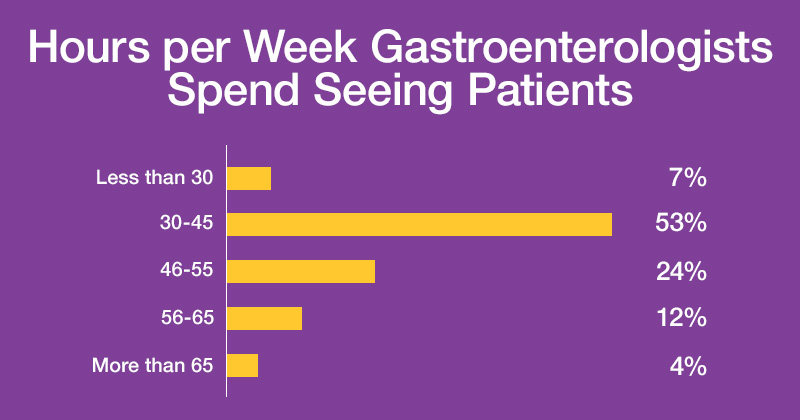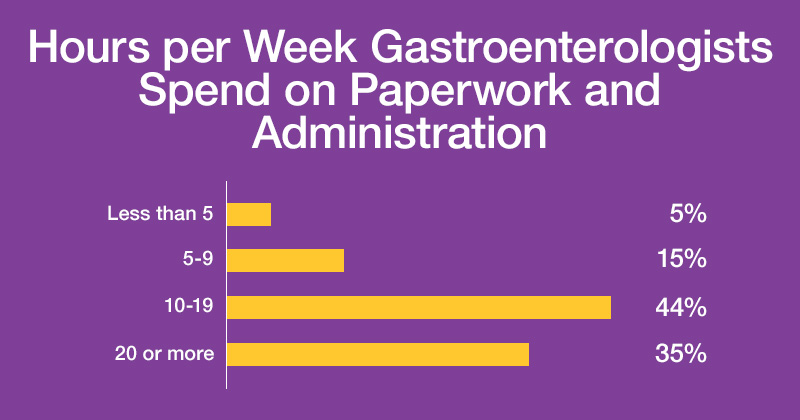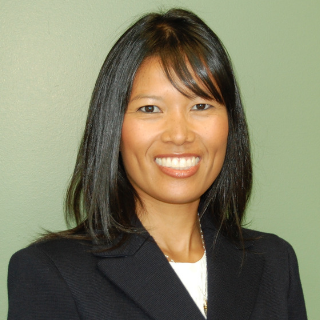Physician Burnout and the Gastroenterologist Lifestyle: How to Maintain Work/Life Balance

Tips from a GI doctor for avoiding physician burnout
A physician’s job is to help keep people healthy, both physically and mentally. But what about the health of the physicians?
These days, more and more gastroenterologists find themselves discouraged and exhausted. This is perfectly understandable, given the overwhelming amount of paperwork, regulations, patient visits and other responsibilities they deal with on a daily basis.
However, the good news is that even with physician burnout all over the headlines, there are many gastroenterologists who still love the work they do. What’s their secret?
Let’s find out. In this article, we’ll take a look at the top factors impacting burnout, as well as some physician burnout treatment tips for helping you maintain your gastroenterology work/life balance.
What Is Gastroenterologist Burnout and What Are the Physician Burnout Rates?
It can be difficult to pin down exactly what the physician burnout rates are. According to the World Health Organization, burnout has now been classified as a “occupational phenomenon” and is characterized by feelings of exhaustion, loss of enthusiasm and a sense of reduced personal accomplishment. Physician burnout also typically involves depersonalization, which is defined as cynicism or lack of compassion for patients and peers.
In a recent study presented by Carol Burke, MD, at the World Congress of Gastroenterology during ACG 2017, 754 gastroenterologists were surveyed using the 22-item Maslach Burnout Inventory. Gastroenterologists had a 49% physician burnout rate, with 17% experiencing low personal accomplishment, 45% experiencing emotional exhaustion and 21% experiencing depersonalization.
Meanwhile, the Medscape Gastroenterologist Lifestyle Report 2018 surveyed about 300 gastroenterologists and found a 44% physician burnout rate among gastroenterologists, including gastroenterologists suffering from depression. This fell just below the average physician burnout rate of 46% across all specialties Medscape surveyed.
Physician burnout often correlates with unhappiness at work and with life in general, so Medscape also measured self-reported happiness levels among gastroenterologists. In fact, gastroenterologists were among the most likely of all specialties to describe themselves as “very” or “extremely” happy at work, at 33%. They were one of the happier specialties outside of work as well, with 53% describing themselves as “very” or “extremely” happy outside of work.
Even if many gastroenterologists are happier than physicians in other specialties, the fact that nearly half experience burnout is a serious problem.
According to the Gold Foundation, the overall rise in physician burnout has contributed to a wide range of negative consequences, including compassion fatigue, compromised professionalism, reduced patient satisfaction, increased medical errors, intent to leave practice, physician substance abuse and even suicide.
So what factors are behind this gastroenterologist burnout epidemic? Let’s take a look.
What Causes Physician Burnout Among Gastroenterologists?
There have been a multitude of studies done on this topic across all specialties, and a wide range of factors have been associated with physician burnout.
One systematic review of studies done across all specialties summarized the main factors associated with increased burnout as the following:
Work factors
- Loss of autonomy at work
- Decreased control over the work environment
- Inefficient use of time due to administrative requirements
- Loss of support from colleagues
Personal characteristics
- Being self-critical
- Engaging in unhelpful coping strategies
- Sleep deprivation
- Over-commitment
- Perfectionism
- Idealism
- Work-life imbalance
- An inadequate support system outside the work environment (e.g., having no spouse, partner, or children)
Organizational factors
- Negative leadership behaviors
- Workload expectations
- Insufficient rewards
- Limited interpersonal collaboration
- Limited opportunities for advancement and social support for physicians
But what about physician burnout in gastroenterology, specifically?
In Burke’s study, the following factors were associated with increased gastroenterologist burnout:
- An EMR system that was not user friendly (reported by 47% of respondents)
- Spending a larger number of hours per week on domestic chores and childcare
- A neutral or dissatisfying spousal relationship
- Spending more hours doing patient-related tasks at home
- Being single
- Having an unemployed spouse or partner
- Having a spouse who spent more hours at work
- Considering early retirement or leaving their current practice within two years (reported by 64% of participants)
- Eating breakfast and lunch on less than half of work days
In Burke’s study, factors associated with decreased gastroenterologist burnout included:
- A user-friendly EMR system
- Older age
- Fewer hours spent per week on domestic chores
- Being somewhat or extremely satisfied with their spousal relationship
- Eating breakfast and lunch on half or more of work days
Of the 46% of respondents who were considering retiring early, the study found that their most common motivations for doing so were changes in reimbursement and regulatory impact, along with maintenance of certification.
In addition, nearly 60% of respondents said they would be willing to utilize resources that promoted their professional and personal well-being. This could bode well for certain resource-based physician burnout treatments.
Notably, the average gastroenterologist reported spending eight hours per day on direct patient care, three hours per day on administrative tasks at work, and two hours per day of work-related tasks at home.
This adds up to thirteen hours per day, which—assuming a relatively generous seven hours of sleep per night—leaves only four hours of free time per day. That’s even less if you include time needed for routine tasks, such as commuting and preparing food.
However, the 2018 Medscape Gastroenterologist Lifestyle Report did not find spending too many hours at work to be the leading cause of gastroenterologist burnout. It came in second behind an excess of bureaucratic tasks, such as charting and paperwork.
Here’s how the Medscape Gastroenterologist Lifestyle Report findings break down:

Interestingly, insufficient compensation ranks fourth among gastroenterologist burnout contributors. With an average gastroenterologist salary of $408,000 according to the Medscape Gastroenterologist Compensation Report 2018, it’s the fourth best-compensated specialty behind plastic surgery, orthopedics and cardiology.
Self-employed gastroenterologists earn slightly more ($424,000) than employed gastroenterologists ($400,000). However, gastroenterologists are slightly less likely to feel fairly compensated compared to the average physician—only 57% are satisfied, even though gastroenterologists’ salaries have increased year over year.
Part of this may be due to the extremely long hours gastroenterologists put in. It can be hard to feel that a paycheck—even a high one—is enough to warrant sacrificing your work/life balance, especially if many of those work hours are spent on unpleasant tasks such as paperwork.
When it comes to work hours, the Medscape Gastroenterologist Lifestyle Report results are similar to those of Burke’s study:


Tips for Preventing Physician Burnout and Improving Gastroenterology Work/Life Balance
So what physician burnout treatments can gastroenterologists use to reclaim more of their time and counteract some of the many factors that contribute to burnout?
There is vast literature on interventional trials and physician burnout treatment measures that have been used at many different levels of the healthcare system, but many of them involve factors you may not be able to control on your own. As far as what you can implement today in your own life and practice for preventing physician burnout, my top tips are the following:
1. Prioritize your wellness by scheduling appointments for yourself.
Schedule time in your calendar for exercise, time with friends and family, meditation, yoga, etc. Don’t allow yourself to cancel or move those appointments.
Maintaining gastroenterology work/life balance is all about prioritization, and where you spend your time shows what your priorities are. During your scheduled free time, don’t look at anything work-related unless it’s urgent.
If you absolutely need to finish up some work when you get home, wait until after your kids have gone to bed if you have kids. Or, better yet, consider implementing a more efficient gastroenterology EHR system that helps you finish your paperwork before you leave the office. That way, you can leave more time for the fun activities you enjoy the most.
Are you the type of person who finds it easy to forget about eating? Make sure to schedule a lunch break for yourself, whether it’s a meal out with your spouse or a quick packed lunch. Eating breakfast and lunch was correlated with decreased burnout in Burke’s study, and it makes sense—it’s easier to feel refreshed and recharged when your body has the fuel it needs.
And finally, if you’re having trouble making room for your personal appointments, it may be time to talk to your staff about your scheduling preferences. If you’re constantly running behind, ask to decrease the number of patients you schedule per day to leave some room to breathe. Or, follow my next tip to help address the reasons why you’re running behind in the first place.
2. Find a task in your office to streamline.
Identify just one clinical or work-related task in your office that you believe can be done more efficiently, come up with a plan and implement it.
Once you’ve done this, you can look for another task to streamline, but even one small task can make a big difference if it’s something you repeat many times each day.
When looking for tasks to streamline, you can also focus on the ones that you find most frustrating in order to help with preventing physician burnout. For instance, if you spend a lot of time typing up notes for each patient, an easy-to-use EHR system built for gastroenterology might be able to generate notes faster with much less typing.
If you have the ability to customize your workflow, you may even be able to create Quick Notes to document entire visits in just a few clicks.
Or if the front desk constantly needs your help in dealing with billing issues, you might want to consider enlisting a gastroenterology billing service to handle billing and collections for you.
Ultimately, it’s all about having the right tools and processes in place to help with physician burnout treatment. Even if one of your chosen tasks requires bigger changes to streamline, it can be well worth it in the long run for the time saved and the peace of mind you can gain.
3. Find a brief stress reduction technique that works for you.
There are a wide range of stress reduction techniques out there, from breathing, meditation and mindfulness exercises to physical activity and squeezing stress balls. The most important thing is to make sure your chosen technique is something you will actually use.
Once you’ve chosen your technique, commit to using it on a regular basis. It can be difficult to make it part of your busy routine, but it helps if you tie it to an existing habit, such as doing it during your morning routine or after a mid-day coffee break. Or, if you know you’ll have the opportunity to take a quick breather in the middle of your workday, use your technique whenever you start to feel overstressed.
Stress reduction techniques can sometimes seem like chores at first, especially ones like meditation that require continual practice to develop. But remember, the payoff can be enormous in terms of your wellbeing and preventing physician burnout.
Conclusion
Gastroenterologist burnout is a complex issue with many underlying causes and no single solution. But as we’ve seen, there are a variety of factors that can help with preventing physician burnout, including more usable EHR technology, prioritizing personal time and even eating more regular meals.
Equipped with the knowledge and strategies we’ve covered in this blog post, you can take steps to help free up more time in your days, reduce feelings of burnout and improve your gastroenterology work/life balance. And when you’re feeling healthy and happy yourself, you’re better able to help improve the health of your patients.
References
Bianchi R, Schonfeld IS. Defining Physician Burnout, and Differentiating Between Burnout and Depression—II. Mayo Clinic Proceedings. 2017;92(9):1455-1456. doi:10.1016/j.mayocp.2017.07.006.
Grisham S. Medscape Gastroenterologist Lifestyle Report 2018: Personal Happiness vs Work Burnout. Medscape Log In. https://www.medscape.com/slideshow/2018-lifestyle-gastroenterologist-6009225. Published January 24, 2018.
Jawa R. ICD 10- Z73.0: Burnout – Arnold P. Gold Foundation. The Arnold P. Gold Foundation. https://www.gold-foundation.org/newsroom/blog/icd-10-z73-0-burnout/. Published December 22, 2017. Accessed May 13, 2019.
October 17 2017. Burnout in gastroenterologists more related to work-life balance than employment factors. Healio. https://www.healio.com/gastroenterology/practice-management/news/online/{7a842baa-e05d-40d4-9181-11a989027c81}/burnout-in-gastroenterologists-more-related-to-work-life-balance-than-employment-factors. Published October 17, 2017. Accessed May 13, 2019.
Pallardy C. 7 gastroenterologists share the secret to a healthy work-life balance. Becker’s ASC Review. https://www.beckersasc.com/gastroenterology-and-endoscopy/6-gastroenterologists-share-the-secret-to-a-healthy-work-life-balance.html. Published April 30, 2015.
Patel R, Bachu R, Adikey A, Malik M, Shah M. Factors Related to Physician Burnout and Its Consequences: A Review. Behavioral Sciences. 2018;8(11):98. doi:10.3390/bs8110098.
Peckham C. Medscape Gastroenterologist Compensation Report 2018. Medscape Log In. https://www.medscape.com/slideshow/2018-compensation-gastroenterologist-6009656. Published April 18, 2018. Accessed May 13, 2019.
